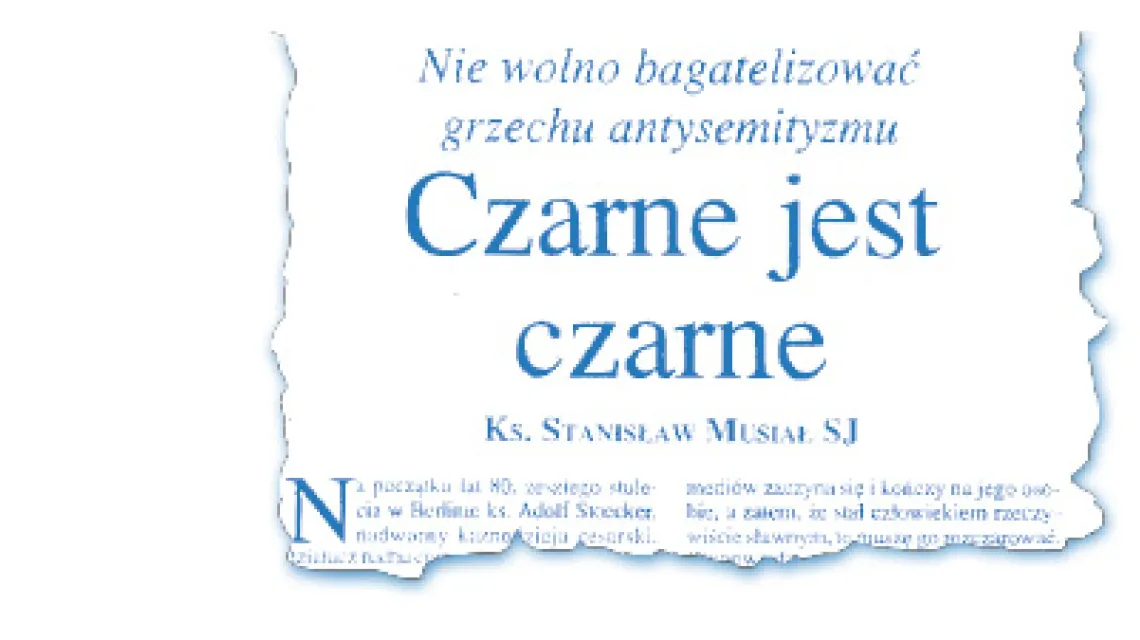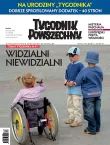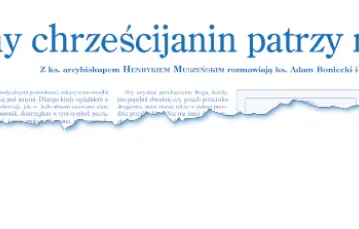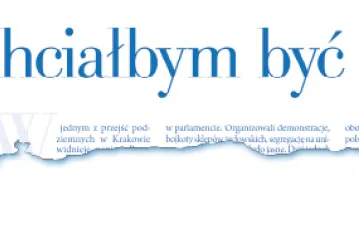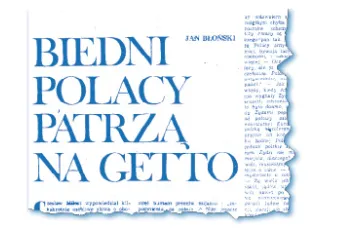Wykupienie dostępu pozwoli Ci czytać artykuły wysokiej jakości i wspierać niezależne dziennikarstwo w wymagających dla wydawców czasach. Rośnij z nami! Pełna oferta →
Father Stanisław Musiał’s text appeared in Tygodnik Powszechny No. 46/97, and a few months later Press magazine awarded “Black is Black" the Grand Press prize for best feature article of the year. In issue No. 2/98, there appeared a polemic - originally published by the Catholic Information Agency (KAI) - by Father Waldemar Chrostowski entitled “Tęcza na czarno" [Black rainbow], with a riposte by Father Musiał and a commentary by Stanisław Krajewski. Father Henryk Jankowski, whose anti-Semitic outbursts Father Musiał had written about, returned to preaching 1998, having been suspended from his duties for a year by Archbishop Tadeusz Gocłowski (another ban imposed by the Gdańsk archbishop in 2004, which saw Jankowski removed as parish priest of St Brygida’s Church, was revoked in 2008 by Archbishop Gocłowski’s successor, Archbishop Sławoj Leszek Głodź).
At the beginning of the 1880s in Berlin, Father Adolf Stoecker - the emperor’s court preacher, an activist in the Christian social movement, and a well-known personality in German Protestantism of the time - thundered in one of his sermons, “We will not rest... until our German nation... rises up to cast off Jewish rule. My German country, Christian nation, I admonish you, wake up!" The record of Stoecker’s sermon shows that the preacher’s call for national reawakening was received with “unceasing and stormy applause." Today we know what demons were awakened in Germany and in Europe, in part because of Catholic and Protestant preachers, such as Father Stoecker. This reawakening of hatred was paid for with the lives of six million Jews, for this many Jewish victims fell to Nazi anti-Semitism.
A New Taboo?
On Sunday, 26 October 1997, the parish priest at St Brygida’s Church in Gdańsk, Prelate Henryk Jankowski, stated, “A Jewish minority in the Polish government cannot be tolerated, because the nation is afraid of it." This was not his first anti-Semitic statement. He had already apologised for some others in a letter to his bishop dated 4 July 1995.
The case of Father Jankowski soon reached beyond the borders of our country. (Apparently Gdańsk was already too small for the prelate.) Press agencies quoted Jankowski’s comment, made 5 November [1997] in Rome, the capital of Western Christendom, “What the Polish nation thinks, I said out loud. Not by mistake, but with conviction."
There is every sign that in the West, interest in the Jankowski affair is not only not diminishing, but is growing. Sad to say, now augmenting the list of names and events of recent history through which Poland is perceived, is “the Polish prelate from Gdańsk" (some have problems even saying his name) - because of his anti-Semitic proclamations.
If Father Jankowski, however, should think that the interest of the world media starts and ends with his person, so that he has become a true celebrity, I must disappoint him. Anti-Semitic statements, by themselves, belong to the genre of ideological bore (a bore that is, of course, extremely dangerous). By their nature, they are intellectually poor and worn out from overuse, like all other fanatical views.
Why then is the international media so interested in Father Jankowski’s case? At this stage, what interests world opinion is not these or others of Jankowski’s anti-Semitic views and statements, but the question of how the Poles react to these statements. To the international public, that is what’s important and interesting. And we cannot hold this against the world, especially the Western media. They have a legitimate right to their interest. We [Poland] want to join the family of European nations. For the West European nations, it is a matter of concern whom they associate with. They have many problems, but they do not have the problem of anti-Semitism appearing in such acute form. These countries know from their own experiences the social disease called “anti-Semitism." Some of them paid a heavy price for it. At their safe, rich table, do they need a sick partner?
How, then, do the Poles react to Father Jankowski’s anti-Semitic statements? How do they cope with this problem?
If in any Western country a cleric, a Catholic priest with fame similar to Father Jankowski’s (he owes this fame, I think, to his fidelity to Solidarity at a time when few dared show it publicly), presented such anti-Semitic opinions, I think many people of good will would protest in the streets. Here, it is still impossible. Though in our society sensitivity and solidarity seem to be awakening today, they express themselves in only one case: if an exceptionally hideous murder has been committed. I think that, in our country, it will be a long time before an anti-Semitic excess or statement would get people moving. After all that happened in our land at the hands of the Nazis, there is still no social awareness that anti-Semitism is deadly by its nature, and in every form, even if often not directly or immediately. In this regard, our past is taking its toll: not long ago, the subject of anti-Semitism was taboo, and to be a patriot meant, in the interpretation of the ruling communist party, to be an anti-Zionist (which in practice equalled being an anti-Semite).
How can we be surprised that Poles do not perceive anti-Semitism as a dangerous evil if, in the case of Jankowski, all bodies influencing public opinion, and all moral authorities, have completely failed? By such bodies and authorities I mean politicians, intellectuals, and, unfortunately, the Church.
The Ignominy of Silence
Politicians appear uninterested in Father Jankowski. Certainly his case does not prevent them from sleeping well. Their hands are full: the new Sejm, the new senate, the new government, the new provincial governors, and their deputies... A history lesson would be timely. That in our century young European democracies fell because they had not paid attention to spreading fascism is, to the minds of new politicians, as strange and remote as the Napoleonic wars. Particularly surprising is the passivity of the political forces born in Gdańsk. They seem not to register that the symbolism of Gdańsk is slowly changing in the mind of the world: from the city that launched the liberation of Poland and Eastern Europe from the communist harness, to the capital of Polish anti-Semitism or even European anti-Semitism. The passivity of Gdańsk’s citizens is also strange; apparently 1945 marks a complete break in their cultivation of the city’s thousand-year-old great traditions.
As for those we call intellectuals, they, too, have been seized by a great impotence. Yes, anti-Semitic statements by Father Jankowski are noted with indignation, but this is a far cry from the power intellectuals once demonstrated in this arena - recall the good old days when Tygodnik Powszechny signed some public protest almost every week, ignoring threats from the secret police. Apparently, intellectuals take fright at the sight of a cassock. Of course, it would be really wrong if they considered the Jankowski affair an “internal" concern of the Church. They would be severely mistaken. The Jankowski case casts shame on Poland, on every Polish man and woman, both religious and atheist. It shames us in the eyes of the world; but even more importantly, it brutalises us.
How does the Church cope with the case of Father Jankowski? Frankly, I would gladly leave this question to future historians who will deal with the matter in detail. For how can one write about the bishops’ reaction - and it is necessary to write about it - and not offend some of our clergy? Yet, Jesus admonished us, “Simply let your ‘Yes’ be ‘Yes’, and your ‘No’, ‘No’." This principle will guide me. I shall not quote names; still, I apologise in advance, because the audience of the mass media will probably not resist the temptation of tying a particular statement to a particular person.
The clergy’s reactions to Father Jankowski’s anti-Semitic statements can be divided into four attitudes. The first approach is unlimited leniency, stemming from not noticing the problem. How else can we evaluate one clergyman’s statement, from 4 November, “Father Jankowski is a man of a particular temperament and he preaches in his own style, and not for the first time... He is a talented man, he loves the motherland, maybe in a slightly different way than the others, but, apart from his temperament, he has a great many values."
A second approach is to circle around, not calling things by their names, resorting to phrases that are hard to understand through Aristotelian logic. How are we to understand the statement that Jankowski “falls into the traps of anti-Semitism?" What traps are these? Who sets these traps? How are we to understand the argument that Jankowski is not an anti-Semite because “he meets with, and has friends among, Jews in the United States and in Poland, and maintains good relations with the Jewish community in the Gdańsk region?" And the most sophist claim, “If he did not deal in politics, he surely would not be accused of anti-Semitism." Politics and anti-Semitism are two different things. Anti-Semitism in the teaching of the Church is a sin against God and humanity. Politics is not. Politics is the art of self-governing by a human society. It can be a dirty thing, but it does not have to be. Dealing in politics, even by a priest, although it is prohibited to the clergy, does not itself necessarily expose the person to “the suspicions of anti-Semitism." Fortunately (a fortune in the misfortune), not all overpoliticised priests in Poland are anti-Semites.
The third attitude, and the most comfortable one, is the perspective of the outside observer. It can take different forms, one time forthright evaluation (“manic views"), another time “grim humour." The latter was the case with the answer a journalist from Życie received after asking which Church penalties canonical code specified for Jankowski’s statements, “‘From a reprimand to quartering’, jokes Bishop -. ‘We don’t perform quartering anymore, but the Archbishop of Gdańsk has at his disposal a whole array of means provided by Church law.’" (The quotation appeared in Życie; I have chosen to omit the bishop’s name.) Yet another time it happened in a register on which I prefer not to comment (in an interview for the Belgian daily Le Soir). I quote it from the Polish press, “Asked why the Episcopate tolerates Father Jankowski’s anti-Semitic statements, which do so much harm to Poland abroad, he answered, ‘My dear sir, I am not a psychiatrist’." What could that journalist think about the Polish Church? (Note that the commotion around the convent in Auschwitz began with an article in the same publication, Le Soir, in October 1985.)
Finally, the fourth approach can be gleaned only from vague accounts here and there in the media, “Great suffering because of the existing situation, prayer, repentance. But these matters are known only to God."
How can we evaluate the first three attitudes? They cannot be termed anything but a banalisation of evil. And a banalisation of evil can be worse than evil itself, because it soothes the conscience and blurs the distinction between good and evil. A surprising answer was given by one of the Episcopate’s delegates to a meeting with representatives of the European Union. Before his departure for Brussels, journalists from the Catholic Information Agency (KAI) asked him if Jankowski was to be a subject of the talks, and he answered, “I see no point in discussing it. Why should we create an international affair because of a statement by one out of 25,000 Polish priests? It is a gross exaggeration; the subject itself does not deserve such treatment." It is hard to agree with his assessment that the subject does not merit high-level discussion, if by “the subject itself" the delegate meant anti-Semitism. It is also difficult to accept his downplaying of the role of the individual. All that is good and all that is bad in this world came from and comes from the individual soul. To take an example from Church history: in the fourth century, Arius was “just one" among many thousands of priests in Egypt, but still his views, namely “Arianism," shook the Church throughout the Roman empire.
The crux of the Jankowski affair [as far as the Church is concerned] is that Polish bishops are not all convinced of the anti-Semitic character of the prelate’s statement of 26 October. (Let us not even mention here his other, similar statements.) Indeed, they are willing to regard it as “political," not “anti-Semitic": one of them has “emphasised... that the statement of the parish priest of St Brygida’s was not anti-Semitic but political."
Tragic Nonsense
Was Jankowski’s statement really just “political"? Let me quote it again, “A Jewish minority in the Polish government cannot be tolerated, because the nation is afraid of it." Let us put aside the problem of whether in the Polish government there is a “Jewish minority" or not. Personally, I must confess I know nothing about this. In addition, the meaning of the word “minority" is unclear: given that there are twenty-three individuals in the Polish government, how many people is this “minority" suppose to count? Also unclear is the meaning of the adjective “Jewish." Perhaps these persons were parachuted onto the roof of the Office of the Council of the Ministers by some foreign commando?
Jankowski’s statement is not simply an anti-Semitic statement without further qualification; it is in fact an anti-Semitic statement of the worst possible, Nazi, kind. Just few days after taking office, which he had done in a legitimate way, Hitler started introducing a programme of the “non-toleration" of Jews. The programme aimed first at judges and lawyers of Jewish descent. (Since there were not yet relevant “laws," this action was conducted in a relatively “humanitarian" way: storm troopers were sent to interrupt judges and attorneys during their work, to force them to leave.) Hitler personally supervised the legislative work intended to remove persons of Jewish extraction from all offices. The relevant law was introduced on 7 April 1933 and included a cynical clause excluding war veterans. Soon thereafter, other professional groups were targeted: doctors, professors, businessmen, workers. The Nazi bureaucracy got entangled in sometimes bizarre situations, naturally extremely burdensome to those affected by the limitations. For example, from August 1941, people of Jewish descent were not allowed to use “roads, water routes, and railroads." In commuting to work, Jews could use public transportation only if the distance exceeded 7 kilometres (and for schoolchildren, 10 kilometres), and they had to give up their seats to Aryans. All these forms of “non-toleration" of Jews-by-descent have their inner iron logic. For if someone cannot be tolerated in the government, why should he be accepted as a teacher, doctor, or even a bootblack? At the end of this logical sequence, only one thing remains: to physically liquidate the “non-tolerated" person.
It is a great pity that the religious authorities, and the moral authorities, in our country are so persistent in trying to demonstrate that black is white. Just repeating it, even with a righteous stubbornness, will convince no one. There is not the slightest doubt that the quoted statement by Father Jankowski comes directly from Nazi anti-Semitism, whether or not its speaker knows and realises it.
“Non-tolerance" of other individuals just because of their biological origins is a dark alley of thinking. There one enters the territory where all reasoning ends, all lights in the human mind go out - indeed, the domain of absurdity and death. To hold against Napoleon, for example, that he was born in Corsica of these and no other parents is completely absurd: he could not help it. He may be judged for his words and actions, but not for his origins.
To make this even clearer, let me use another example, this time with Polish twist. (Of course, my example is completely invented.) In the year 2050, a conclave convenes to elect a new pope. Among the prescribed number of electors is a “Polish minority" of eight cardinals. There is a custom that the pope be elected from among the cardinals participating in the conclave. Just before the first vote, the cardinal-speaker rises from his seat and states that, in the interest of the Church, no representative of the “Polish minority" can be voted for. Asked whether Polish cardinals lack proper qualifications to hold the office of pope, he answers no, all of them have all necessary skills and qualities to an extraordinary degree; there is only one obstacle - they are “biologically" Poles. The news of cardinals’ veto reaches the Poles. Everybody is shocked.
While on this subject, I wish to mention that there has been, in Church history, a case of a Jew occupying the pope’s throne (completely apart from St Peter, of course). This man was Anacletus II (1130-38). His grandfather was a convert to Christianity. He is listed among the anti-popes only because his competitor, elected the same day, survived him by a few years (Innocent II, 1130-43). St Bernard of Clairvaux, who enjoys a reputation as one of the medieval figures most sympathetic towards the Jews, reacted to Anacletus’s election in a “racist way," stating that “electing a Jewish offspring to Peter’s capital offends Christ."
Every Polish citizen is equal before the law, no matter what his or her other predicaments: whether possessed of six fingers on the right hand, whether a pygmy by origin, or a worshipper of crocodiles. Besides, no contemporary Poles are able to prove their pure Polish “race"; such a thing does not exist. No Pole can even reconstruct a family tree back to, say, the eleventh century.
Sin
One more important issue remains here: How does the Church label anti-Semitism? In the autumn of 1997, anti-Semitism met firm and solemn resistance in Pope John Paul II’s speech at a Vatican symposium on the roots of Christian anti-Semitism. And I would like to quote two further Church statements. The first dates from before the Shoah, the Nazi destruction of the Jews. On 28 March 1928, the Congregation of the Holy Office in Rome issued a verdict that read (in a single sentence, like all its verdicts): “The Holy See... reproaches
and particularly condemns hatred towards the people formerly chosen by God which in common language is called ‘anti-Semitism.’" The second statement - for me the most important in this regard - is the one made by Pope John Paul II on 16 November 1990, “Anti-Semitism, like all forms of racism, is a sin against God and humanity, and as such must be rejected and condemned."
If anti-Semitism is a sin, then for a religious person the matter assumes a different dimension. It is no joking matter, as we say. For a Christian, committing “a sin against God and humanity" means breaking the bond with God (as if one cut a live branch off a tree, though this comparison may be a little weak) and cutting off the network of relations with other people. Thus it is a serious matter.
If publicly, in the eyes of the whole world, the sin of anti-Semitism has been committed - for the statement by Father Jankowski of 26 October was anti-Semitism of the worst kind - then it is a historical misunderstanding to try to place this act in the category of “politics," as was done, for example, in the decree suspending Jankowski for a year from his post as parish priest. Things must be called by their names. Otherwise, the Church in Poland loses its credibility, not only in the eyes of the world but also among its own flock. Jesus said, “Simply let your ‘Yes’ be ‘Yes’, and your ‘No’, ‘No’; anything beyond this comes from the evil one." Let it be clearly stated that the person of Father Jankowski is merely the backdrop for this issue. Nobody is anxious to oppress, trample to dust, and destroy this priest, who has great achievements to his name. Even the punishment meted out to him (for his “politics") could have been lighter: for example, studying ecclesiastical writings on the subject of mutual relations between the Church and Judaism (with an exam before a specially assigned commission of experts). Our first concern should be with enlightening the minds of the faithful and properly shaping their consciences in regard to the sin of anti-Semitism.
Should not the Church in Poland, with its universities, seminars for the clergy, and its highly qualified body of specialists, put out a letter, or longer clerical admonition, entitled “What Is the Sin of Anti-Semitism?" - naturally written in plain, comprehensible language, and “calling a spade a spade." Who else can assume the Church’s role in this? We must recall that it is not only Hitler who killed Jews (including over a million children, which is often forgotten). With him it was in the name of his racist, pagan anti-Semitism; but Jews were also killed through the sin of anti-Semitism in previous centuries, in physical violence committed by Christians in spite of the teaching of the Church, and in spite of many papal decrees protecting Jewish persons and property. Were such a letter or admonition now issued, we could walk towards the third millennium of Christianity with lighter hearts. Maybe we could even enter it hand in hand with our “older brethren in faith" - for they would not have to fear us anymore.
FATHER STANISŁAW MUSIAŁ SJ (1938-2004), a philosopher by education, a priest and community worker by calling, was a long-time contributor and a deputy editor of Tygodnik Powszechny (in 1990-91, he was deputy editor-in-chief).
A member of the Polish Episcopate’s Commission for Dialogue with Judaism in the years 1986-95, he participated together with Jerzy Turowicz in international talks on moving the Carmelite convent from the site of the former Auschwitz concentration camp. He also opposed the campaign to erect crosses at the gravel pit at Auschwitz and the exhibition at Sandomierz Cathedral of paintings showing Jewish ritual slaughter. He expounded his views on the subject of Christian-Jewish relations in a series of conversations with Witold Bereś and Krzysztof Burnetko, published posthumously as Duchowny niepokorny [Priestly but defiant].

